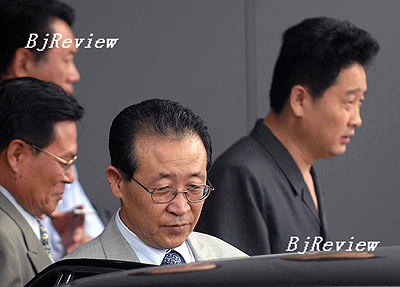
After a five-month stalemate, the United States and North Korea finally surmounted the first obstacle in the "action for action" phase in resolving the latter's nuclear issue.
Following the release of frozen North Korean bank accounts in Macao's Banco Delta Asia (BDA), South Korea began to ship the 50,000 tons of heavy fuel oil it had promised to North Korea and planned to complete the shipment in 20 days. Three days later on July 15, North Korea confirmed that it had shut down the Yongbyon nuclear facility. The International Atomic Energy Agency (IAEA) later verified the closure.
The heads of the delegations of the six-party talks on the Korean nuclear issue met in Beijing on July 18-20. While reviewing the progress made in implementing the joint document signed on February 13, the six parties involved-North Korea, South Korea, China, the United States, Russia and Japan-discussed further actions to take in the next phase. The denuclearization process on the Korean Peninsula is expected to speed up.
The success achieved so far is significant in that the United States and North Korea have begun to foster trust toward each other. According to the joint document, actions in the initial phase shall be implemented within 60 days after the document is signed. However, because the United States failed to resolve the issue of frozen bank funds, North Korea refused to honor its commitments as scheduled. This move aroused suspicion of the sincerity of both Washington and Pyongyang to implement the agreement made during the last round of six-party talks on February 13.
Despite the signing of the joint statement after the fourth round of the six-party talks in September 2005, the North Korean nuclear issue became even more agonizing. That's primarily because the United States froze North Korea's $25 million in the BDA and imposed financial sanctions against the country. In this context, the two countries could hardly establish mutual trust, something that is essential for them to put the joint statement in practice.
After a series of competitive moves both covert and overt, including North Korea's underground nuclear test last October, the United States finally agreed to release the funds, but it imposed harsh penalties on the BDA. As a result, North Korea was unable to transfer the money to other banks. Whether the issue could be resolved had a crucial bearing on North Korea's attempts to break the U.S. financial sanctions. More importantly, it provided an opportunity for North Korea to see how sincere the United States was.
At this critical juncture, the U.S. policy change was thought provoking. The country was patient enough not to urge North Korea to honor its commitments until the issue of the funds was settled. It also demonstrated great sincerity. Although other banks were reluctant to receive the funds because of the U.S. Treasury's penalties on the BDA, the United States granted a written guarantee to a Russian bank that it would not be punished for transferring the money.
Moreover, the United States showed considerable confidence that North Korea would undertake its commitments after the frozen fund issue was resolved. In doing so, some critics said that the Bush administration was revisiting former President Bill Clinton's policy toward the North Korean nuclear issue.
The reason for the policy change is two-pronged. The Bush administration desperately needed a diplomatic victory at a time when it had been plunged into an embarrassing situation both at home and in the international community because of the Iraq War. Also, North Korea expressed the hope of improving bilateral relations in explicit terms, which created a historical opportunity for the United States.
By seizing this opportunity, the United States could not only resolve the immediate problems, but also ameliorate its strategic deployment in East Asia. The depth of cooperation in the U.S.-Japan military alliance is unlikely to be altered drastically despite changes in the external situation. Their antimissile system is currently undergoing live ammunition tests. The settlement of the North Korean nuclear issue will not affect the development of this system. Instead, it will enable the two allies to focus on other more important strategic issues.
A positive trend
Changes in the mindsets of the United States and North Korea were evident on many accounts. For example, events that could be detrimental to mutual trust in the last few months, such as the joint military exercise between the United States and South Korea and North Korea's missile tests, did not trigger the strong reactions they previously had.
Now that both countries believe that they should improve bilateral relations, they will take more steps to enhance mutual trust. The release of the funds is only the beginning. In the next phase, the two countries are expected to have more interactions, and the other countries involved in the six-party talks will have to consider how to accelerate the discussions.
There have already been signs that the talks will speed up. The Bush administration is eager to achieve a decisive result before the 2008 presidential elections. Following the June visit to North Korea by Christopher Hill, U.S. Assistant Secretary of State for East Asian and Pacific Affairs who heads the American delegation to the six-party talks, the United States plans to send Secretary of State Condoleezza Rice to the country. The United States also hopes to hold a foreign ministers' meeting in the framework of the six-party talks in early September and to complete the disablement of North Korea's nuclear facilities by the end of the year.
| 